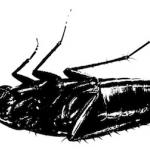Monsters of Modernity: The Metamorphosis at 100

"As Gregor Samsa awoke one morning from uneasy dreams he found himself transformed in his bed into a gigantic insect."
Go back and read that opening line. Try, if you can, to de-familiarize yourself with it. Picture it in your head. Allow yourself to be surprised by the imagery. Wake up, in your bed, after a dream you wish to never revisit, only to discover that something is very wrong.
Make the realization that you are now, and without explanation, a massive crawling creature reminiscent of a cockroach, a beetle or a bed bug. Let the truth of this realization sink in: the confusion, the panic, the powerlessness, the utter abject terror. The knowledge that when your nearest and dearest see you they will now recoil in disgust and potentially try to destroy you. That you are now decisively outside of humanity.
It is for good reason that this line, and those in the pages that follow, have become some of the most iconic in 20th century Western literature. There are worthy debates about how accurate a translation this is, but those final two words -- whether they read as "gigantic insect" or "monstrous vermin" -- are at once profoundly unsettling and irresistibly magnetic.
It has been almost exactly one hundred years since The Metamorphosis first appeared in print. Franz Kafka originally had written it in 1912 as a diversion from a tormentive case of writers' block while working on another novel. Countless revisions and the onset of World War I delayed publication for almost three years until October of 1915.

drawing by Franz Kafka
Nine years later, Kafka was dead and still relatively unknown. His best friend Max Brod had been left with instructions to burn his late confidant's papers, which included most of the works we identify with Kafka. Brod thankfully disobeyed his friend's dying wishes (and some insist that they were never intended to be taken seriously anyway). Along with the rest of the author's work, The Metamorphosis was banned in Nazi Germany and the Soviet Union. During the Prague Spring in Czechoslovakia, Kafka's stories experienced a resurgence of interest before the Russian tanks rolled in and crushed the city's radical and democratic aspirations. For the next twenty years, Kafka was banned in his home country too.
There is an endless amount to say about Franz Kafka and The Metamorphosis in particular. But the peculiar and troubled history of its author illustrates why it is such an important story that remains transfixed in the popular imagination. It is a unique, emotive and particularly effective portrayal of a modern world spun well beyond our control and the toll it takes on the human psyche.
Kafka's Politics and the Stumbling Block of Allegory
It is tempting to view The Metamorphosis as a work of political allegory. Kafka's own radical beliefs add to this pull, and have led some to see Gregor as a stand-in for the proletariat, his family as the masses, so on and so forth. There are plenty of well-meaning radicals and Marxists who have insisted it is just that. But this kind of analysis is extremely limited in scope, and potentially blocks us from appreciating the full artistic reach of a writer like Kafka and a story like The Metamorphosis.
This is not to say that Kafka's politics had nothing to do with the story. They most surely did. By the time he wrote The Metamorphosis, Franz Kafka had enthusiastically embraced far left, anarcho-communist beliefs. He had attended anti-militarist and anti-statist meetings, and his journals were filled with declarations such as "always remember Kropotkin."
These politics -- what Michael Lowy identified in Kafka as "romantic libertarian socialist" -- set the author well enough apart from the kind of crude mechanics that might yield an analysis of his work as being some kind of rote parallel. To be blunt, Kafka was far too imaginative for that. It's significant that Soviet and Eastern Bloc regimes, having long since abandoned any kind of genuine and supple dialectical materialism central to real Marxism, were intimidated by Kafka and labeled his works "decadent." His central themes -- that alienation was very real, that it did horrible and terrifying things to the human condition, not to mention his scathing indictments of all things bureaucratic -- couldn't have reflected well on the vast shortcomings of "actually existing socialism."

drawing by Franz Kafka
As Marxist literary critic Ernst Fischer said during his speech at a conference on Kafka held in Czechoslovakia in 1963 (five years before the latter would be officially banned):
Kafka is a poet who concerns all of us. The alienation of man that he depicted with maximum intensity, assumes horrifying proportions in the capitalistic world. However, it is by no means surmounted in the socialist world. To overcome [this phenomenon] step by step, by fighting against dogmatism and bureaucracy and for socialistic democracy, initiative and responsibility, is a long process and a great task... The socialist reader will find traits of his own problems within [his works], and the socialist functionary will be coerced into reasoning certain questions in a more thoroughly and differentiated manner.
This "differentiated manner" challenges our thinking processes to go beyond simple metaphor. Die Weissen Blaetter, the first journal to publish the story, was one of the most important publications of German Expressionism. And much like the Marxism of Fischer and other dissident radical acolytes of Kafka, Expressionism was an outright revolt against the "official" rationalism of its era. It drew attention to the neglected, hidden gothic corners of human existence that called into question positivist notions of a free, happy and self-actualized society. With the madness of World War I only right around the corner, such a call to question would be well-suited.
To read the rest of this essay, please go to http://www.redwedgemagazine.com/online-issue/monsters-modernity-metamorphosis
Alexander Billet is a writer, poet and cultural critic. He is a founding editor at Red Wedge and has also appeared in Jacobin, New Politics, TheNation.com, the International Socialist Review, In These Times and other outlets. He can be reached through Twitter: @UbuPamplemousse
